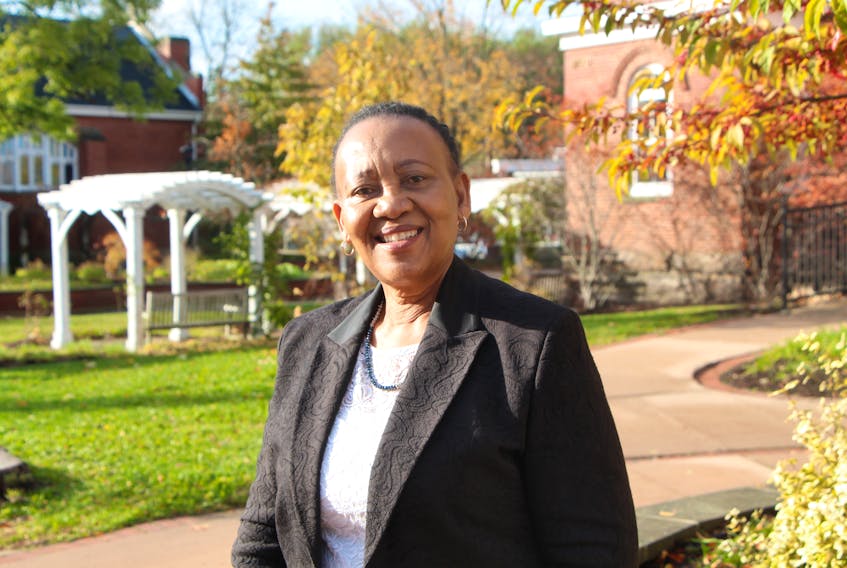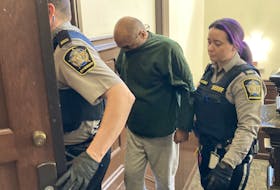Sadi Motsuenyane, the new chair of social justice for the Coady International Institute, works to follow in the spirit of the institute’s founder, Moses Coady, in doing what she does best; community building.
Motsuenyane focuses on asset-based community development, which is essentially “the vision of the late Reverend Doctor Moses Coady and the Antigonish movement,” she said.
Motsuenyane described community as being about “empowering people and ensuring those people are able to use their assets in a responsible way.”
The connection between healthy communities and her role is implicit, since “the core of community development is social justice,” Motsuenyane said.
Motsuenyane said building a community is a feat that is accomplished through the asset-based community development (ABCD) model; one that empowers people to get to a point of building communities that can sustain themselves.
“Asset-based community development has added and revolutionized the way I have always did community development. It emphasizes the assets that people must be able to use, whereas we have focused before on people’s needs,” Motsuenyane said. “When you talk about people, it’s often ‘what can the government do for you?’ The Coady approach is about (asking) ‘what do you have?’ or ‘How can you build on what you have?” instead of always asking people what it is that the government can do for them, because the consequence of that is dependency.”
Part of Motsuenyane’s job is sharing, learning about, and promoting social justice, by addressing equality and political issues. These issues are very close to people, she noted, “because people live on land and use resources.”
“So when you talk about the asset-based community development, it means people must be able to use their own assets in a manner in which they will be able to sustain their livelihoods.”
Motsuenyane’s work has her working with Coady students, the community at large, numerous cultural and political groups and the student body on campus, “sharing and learning,” by encouraging discussions and dialogue, and through lectures.
Through engagements and sharing with students and the community, Motsuenyane informs and learns. She described the process as “quite interesting and intense, sharing with these students. One realizes that there’s a hunger for more.”
The purview of Motsuenyane’s work touches on economics, health and even history, drawing on her experience community building in her native South Africa, through the South African Truth and Reconciliation Commission – and how it compares to the Canadian Truth and Reconciliation Commission, and the legacies both commissions face.
Motsuenyane’s career up to this point has drawn upon her deep, hands-on insight into the dynamics at play in building a community, since she started her work in the time of apartheid, and continues to work to rectify inequalities in communities in South Africa that exist even under its current democratic elected government.
It was in her helping South Africa, in the wake of the failed oppressive regime of apartheid, and through her attempts to more evenly distribute resources to people in need, that Motsuenyane met Gord Cunningham with the Coady in Cape Town – the beginning of her academic and vocational relationship with the Coady.
“The apartheid system disenfranchised black people and denied them their economic rights, which affected their process of development. When one reflects on history and the evolution of apartheid in South Africa and how it impacted social justice, you’ll find that students want to know more about what’s happening in South Africa,” Motsuenyane said.
Starting her career in the toxic racial politics of the apartheid system, Motsuenyane watched what went wrong when communities were built around the uneven distribution of services and resources, based on race, as was the case in South Africa until 1994.
Her experience with South African community building has allowed Motsuenyane to see patterns, like the similarities between the reserve systems used in South Africa and Canada, and the dangerous legacies of laws, like the Land Act of 1913, as forces that can impact how communities grow.
Motsuenyane compared her career up to this point to a series of bridges, “mainly centered around people,” and in her work moved from health and medical science to the social sciences, focusing on health of individual and the community level.
“I started my career as a registered general nurse, but then deviated to development studies and community development,” she said. “I majored in community health nursing, nursing admin and carried those into community development. There can never be community development without health.”
For Motsuenyane, community development is not just something she took as part of her course load when she studied at the Coady.
“For me, it’s not just theory; it's something I have lived at home. I was brought up in an environment where community development is practiced and my parents were community developers in their own right. The training and all that was just enhancing what I already had.”
An aspect of being social justice chair that Motsuenyane cherishes is the breadth and scope of the learning and teaching it entails.
“It’s not limited to your social science issues, per se. You have to present, and it broadened my own scope. I’m not just sharing, but in the process, learning a lot; because I have to do a lot of research to cover certain areas that aren’t fully within my scope, but which are linked to social justice. I also have to contextualize the particular class I have to talk to.”
Motsuenyane said she already feels like she is making a contribution to the education of the students and the community at large – a process she describes as “intensive, educational and very engaging.”
Motsuenyane began as social justice chair on Sept. 20, in what she described at an Oct. 25 meet and greet as “a baptism by fire,” since she started by presenting a keynote address at the Nova Scotia Career Development Association Extension Conference in Wolfville. She is a graduate of the Coady’s ABCD and Livelihoods and Markets programs. She has also served as a member of the Coady advisory board.









